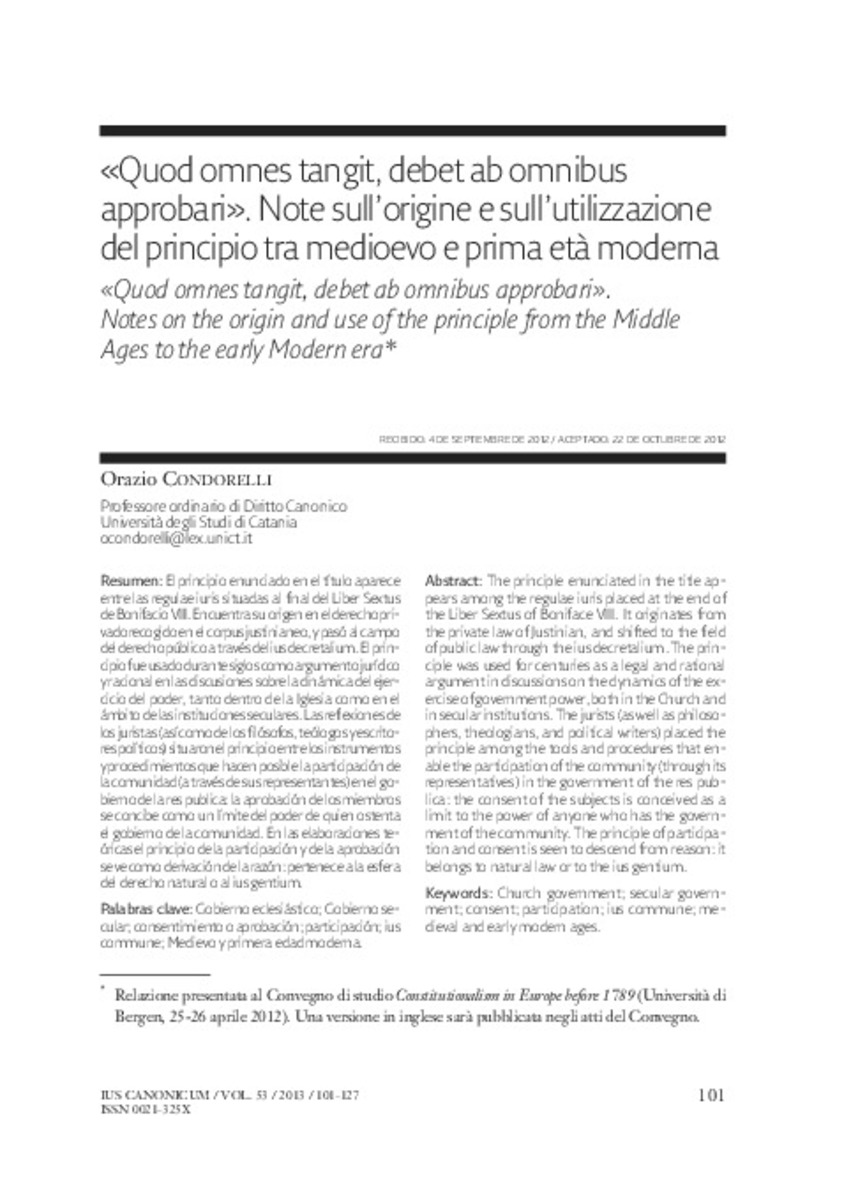Full metadata record
| DC Field | Value | Language |
|---|---|---|
| dc.creator | Condorelli, O. (Orazio) | - |
| dc.date.accessioned | 2016-06-08T10:25:32Z | - |
| dc.date.available | 2016-06-08T10:25:32Z | - |
| dc.date.issued | 2013 | - |
| dc.identifier.citation | Condorelli, Orazio. «Quod omnes tangit, debet ab omnibus approbari». Note sull’origine e sull’utilizzazione del principio tra medioevo e prima età moderna. vol. 53 nº 105, pp. 101-127 | es_ES |
| dc.identifier.issn | 0021-325X | - |
| dc.identifier.uri | https://hdl.handle.net/10171/41290 | - |
| dc.description.abstract | The principle enunciated in the title appears among the regulae iuris placed at the end of the Liber Sextus of Boniface VIII. It originates from the private law of Justinian, and shifted to the field of public law through the ius decretalium. The principle was used for centuries as a legal and rational argument in discussions on the dynamics of the exercise of government power, both in the Church and in secular institutions. The jurists (as well as philosophers, theologians, and political writers) placed the principle among the tools and procedures that enable the participation of the community (through its representatives) in the government of the res publica: the consent of the subjects is conceived as a limit to the power of anyone who has the government of the community. The principle of participation and consent is seen to descend from reason: it belongs to natural law or to the ius gentium. | es_ES |
| dc.description.abstract | El principio enunciado en el título aparece entre las regulae iuris situadas al final del Liber Sextus de Bonifacio VIII. Encuentra su origen en el derecho privado recogido en el corpus justinianeo, y pasó al campo del derecho público a través del ius decretalium. El principio fue usado durante siglos como argumento jurídico y racional en las discusiones sobre la dinámica del ejercicio del poder, tanto dentro de la Iglesia como en el ámbito de las instituciones seculares. Las reflexiones de los juristas (así como de los filósofos, teólogos y escritores políticos) situaron el principio entre los instrumentos y procedimientos que hacen posible la participación de la comunidad (a través de sus representantes) en el gobierno de la res publica: la aprobación de los miembros se concibe como un límite del poder de quien ostenta el gobierno de la comunidad. En las elaboraciones teóricas el principio de la participación y de la aprobación se ve como derivación de la razón: pertenece a la esfera del derecho natural o al ius gentium. | es_ES |
| dc.language.iso | ita | es_ES |
| dc.publisher | Servicio Publicaciones. Universidad de Navarra | es_ES |
| dc.rights | info:eu-repo/semantics/openAccess | es_ES |
| dc.subject | Medieval and early modern ages | es_ES |
| dc.subject | Ius commune | es_ES |
| dc.subject | Participation | es_ES |
| dc.subject | Consent | es_ES |
| dc.subject | Secular government | es_ES |
| dc.subject | Church government | es_ES |
| dc.subject | Ius commune | es_ES |
| dc.subject | Participación | es_ES |
| dc.subject | Consentimiento o aprobación | es_ES |
| dc.subject | Gobierno secular | es_ES |
| dc.subject | Materias Investigacion::Derecho canónico | es_ES |
| dc.subject | Gobierno eclesiástico | es_ES |
| dc.title | «Quod omnes tangit, debet ab omnibus approbari». Note sull’origine e sull’utilizzazione del principio tra medioevo e prima età moderna | es_ES |
| dc.title.alternative | «Quod omnes tangit, debet ab omnibus approbari». Notes on the origin and use of the principle from the Middle Ages to the early Modern era | es_ES |
| dc.type | info:eu-repo/semantics/article | es_ES |
| dc.identifier.doi | 10.15581/016.53.784 | es_ES |
Files in This Item:
Statistics and impact
Items in Dadun are protected by copyright, with all rights reserved, unless otherwise indicated.






